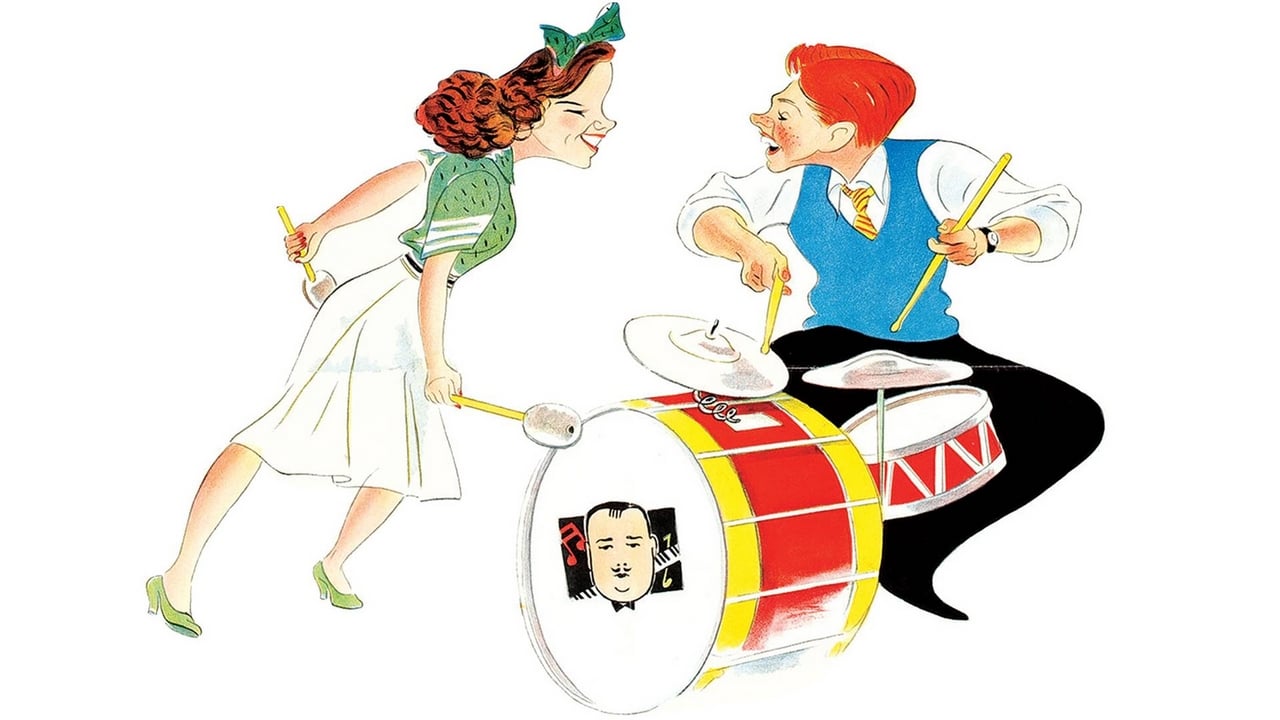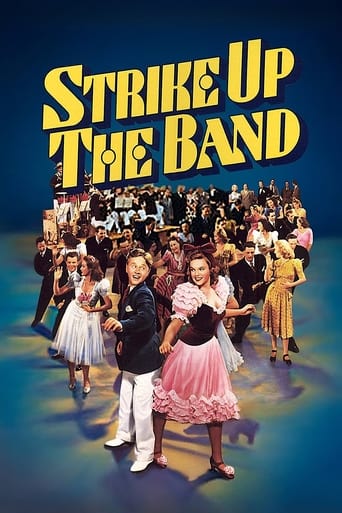Kattiera Nana
I think this is a new genre that they're all sort of working their way through it and haven't got all the kinks worked out yet but it's a genre that works for me.
Ceticultsot
Beautiful, moving film.
Edwin
The storyline feels a little thin and moth-eaten in parts but this sequel is plenty of fun.
Celia
A great movie, one of the best of this year. There was a bit of confusion at one point in the plot, but nothing serious.
TheLittleSongbird
Being a huge lifelong fan of Judy Garland, with a voice that you can listen to for hours and tire of, and who likes her paired with Mickey Rooney (a multi-talented performer with a tendency to overdo it), 'Strike Up the Band' was definitely something that couldn't be missed.To me, 'Strike Up the Band' is the second best of their four "backyard" musicals. Their best being 'Girl Crazy', the best paced of the four and with the best songs and choreography, even if the story is not as good as the rest of the film. Faring weakest is 'Babes on Broadway' ('Babes in Arms' was a slightly better film regardless of its bowdlerisation of the source material), that film gets a lot right still but is too sentimental, contrived and corny in places with some out of place patriotism and a sour-taste-in-the-mouth finale. All four are worth watching though, and all four are well above average films.'Strike Up the Band' is not perfect either, its Achilles heel being the far too corny, melodramatic and ponderous middle third (a shame because the film is actually very well paced for most of it and then drags badly in the non-musical moments of the middle third). The dialogue warms the heart and moves sometimes but the silly corniness of some of it is cringe-worthy.Lastly while the cast are mostly splendid, there is one exception and that is the terribly annoying June Preisser (just as much as in 'Babes in Arms'), enviously athletic dancing is not enough for an obnoxious character played far too broadly to unbearable degrees.However, even when not in Technicolor, 'Strike Up the Band' still looks lovely in crisp black and white and with elegant production design. As said, on the musical front (production values, songs, vocal performance, arrangements, choreography and dancing) 'Strike Up the Band' fares significantly better. The songs are great, not as great as the scores for 'Girl Crazy' and 'Babes in Arms' but almost. The three best songs being the plaintive "Our Love Affair", the exuberant "Drummer Boy" and the barn-storming "Do the La Conga".Busby Berkeley's direction and how he stages the songs are not quite as imaginative, witty or dazzling as some of his other films, but it doesn't come over heavy-handedly and it has charm, tenderness and energy, particularly in the aforementioned three songs. Unlike 'Babes on Broadway', sentimentality is avoided thankfully and is replaced by a lot of entertainment and heart-warming. The story is unexceptional but is full of energy, fun, heart and charm, palling only in the non-musical moments of the middle third.Rooney and Garland make 'Strike Up the Band' especially worth seeing, they are both on top form and their chemistry irresistible. From personal opinion, of the four Rooney-Garland "back-yard" musicals (despite 'Babes in Arms' being the one to get the Oscar nomination) this contains Rooney's best performance of the four, his role really plays to his strengths and even stretches him in showing more talents that one never knew he had (i.e. didn't know he could play the drum so well). Garland is as ever radiant and deeply touching, "Our Love Affair" being one of the most poignant renditions of any song in a film she starred in (very near the top too, and the list is long). Paul Whiteman, not the "King of Jazz" for nothing, contributes hugely to the film's appeal too.Overall, a thoroughly enjoyable film, a must for Garland fans and a must for anybody wanting to see what the fuss is about with her and Rooney together. 7/10 Bethany Cox
Steven Torrey
Despite the excellence of dance, music, singing, acting--though one always suspects the combination of Rooney / Garland was more being themselves than acting--the movie cannot transcend its severe limitations. The movies sound exactly what they were--high school kids putting on a performance and such acting is exactly that-high school kids putting on a performance. Despite Freed, Busby Berkeley, Paul Whitman, and the singing and dancing of Rooney & Garland-- the movie fails. I can watch "The Music Man', "My Fair Lady', "Gigi", Fred Astaire & Ginger Rogers--and never get tired; while these four movies wear thin after first viewing.
weezeralfalfa
Warning! The corn grows high and the sap flows freely! Overall, this is my least favorite of the 4 B&W musical comedies, from '39 -'43, starring Mickey and Judy. Most of these, including this one, were actually musical extensions of the Andy Hardy series format. Hence, extensive portions deal with the teenagers, usually led by Mickey, with Judy's support, having to beg permission from authority figures, including their parents, to put on a musical or dramatic show, and the practical problems of securing financing and an adequate place to put on the show.In this one, Mickey, as the bored drummer for the High School band, leads a crusade to form a school-sponsored dance band, providing an opportunity for the other bored band members to play current pop music, and hopefully making some money for the school and themselves. Judy, backed by the rest of the glee club, will do most of the singing. The principal gives his hesitant OK. Thus, we have Busby Berkeley's spectacularly staged , manic, "La Conga" Latin-themed dance production. There would be the roughly equivalent manic production "Hoe Down" at this spot in the subsequent "Babes on Broadway" Meanwhile, Mickey talks to his 'pal' Judy about the problem of his mother expecting him to become a doctor, like his dad, while he thinks he's cut out to be a musician. Later, we go through the same thing directly with his mother, in quite a sappy scene. She's initially upset, but eventually reluctantly agrees that he can try out his ambition. Later, when the Paul Whiteman band miraculously shows up in town for Barbara's birthday, Mickey is given an opportunity to turn professional when one of Whiteman's sidemen decides to form a new band. Initially ecstatic, Mickey's mother reminds him that he is the leader of the HS dance band and their ambition to win Whiteman's content on his radio show. She suggests that his leadership role in the local community is presently more important than starting a career elsewhere. Reluctantly, he agrees. Also, meanwhile, Judy is dissatisfied with her status as Mickey's 'pal'. She wants to be his acknowledged girlfriend, expressed in song in "Nobody". Unfortunately, a very aggressive siren rich girl(June Preisser, as Barbara Morgan)has moved into town, and immediately starts working on Mickey(Why? He wasn't handsome, a star athlete, nor wealthy). Of course, Judy is jealous and Mickey very conflicted, but Judy decides an uneasy cooperation with Barbara is the best policy for the present. As things turn out, Barbara's father is the savior of the band's ambition to perform on the Whiteman show. At the last minute, one band member(Willie) needs a quick expensive operation, draining the money raised for the trip to the show(in a sappy scene).. Barbara's influential father is impressed, and he arranges for a quick train trip for the band. Before this episode, her father arranged for Whiteman's band to play at Barbara's birthday party, giving Whiteman a chance to hear the dance band, who play "Drummer Boy" with Whiteman's instruments, Mickey being the manic drummer, of course.The biggest problem with the film is the long, mostly boring, New Rochelle archaic drama, in the middle. This includes all the stereotypical elements of bygone stage and silent film drama: a villain trying to take advantage of a destitute young woman(Judy), a savior(Mickey), who marries her, then eventually becomes a drunkard and wiles away all their money, the girl being tied to a train track for refusing to give into the villain, the savior tied to a log-cutting machine, about to be cut in half, and a guardian angel, in the form of their deceased son, coming to untie Mickey so he can save Judy. The purpose of putting on this show was to raise money for their trip to Whiteman.After a sappy speech by Mickey, the big, somewhat flag-waving, finale mostly consists of reprisals of the major songs, with the Gershwin-composed title song the first and last featured. The most popular original song in the film: "Our Love Affair" is redone, with 4 large harps near the relevant Mickey-Judy couple. The first time this was played, Mickey wasn't thinking of Judy in a romantic context. This earlier rendition also included an animated nuts and fruit orchestra: a rather novel gimmick for its day.This was the second and last time in this film series that dimpled, baby-faced, June Preisser played the obnoxious superrich siren competitor with Judy for Mickey's attention. Besides her looks and personality, she was known for her gymnastic dancing and contortion skill, which she very briefly gives samples of in this film. As in "Babes in Arms", she is directly or indirectly responsible for providing the money for the 'gang's' show biz ambitions. This time, she participates in several productions, including the finale, without the bitter competition with Judy for the lead female show role, as in "Babes in Arms". Her film career ended in the late '40s, when she was no longer wanted to play sexy high school girls.Ann Shoemaker switched from playing Judy's mother in "Babes in Arms" to being Mickey's mother in this film.Be sure to see the hilarious musical cartoon "Romeo in Rhythm", accompanying the current DVD.
jost-1
A delightful high-energy romp. I think Mickey Rooney outshines Judy Garland in this one (but that might be like comparing apples to oranges, which incidentally play a not incidental role in this movie). Mickey plays the piano, the drums, sings, dances, pitches baseballs and jumps over fences and hedgerows....plus he's good to his widowed mother and turns up the "life's a gas" charm at the drop of a hat. Judy is more serious, reflective, and tender, all of which works well in the songs she performs. I could have done without the extended "Snidely Whiplash" melodrama routine, but hey, what's perfect in this world. The teenagers in this movie, however, look like miniature adults, and moreover, some of Mickey's band members look a little long in the tooth. Was there really a time when jazz was the most shocking thing a kid could be interested in?

